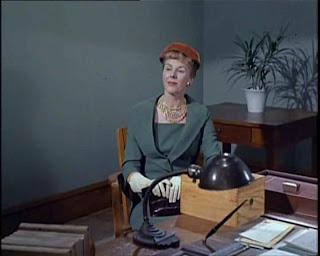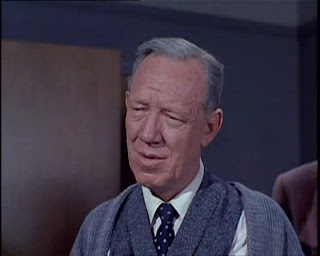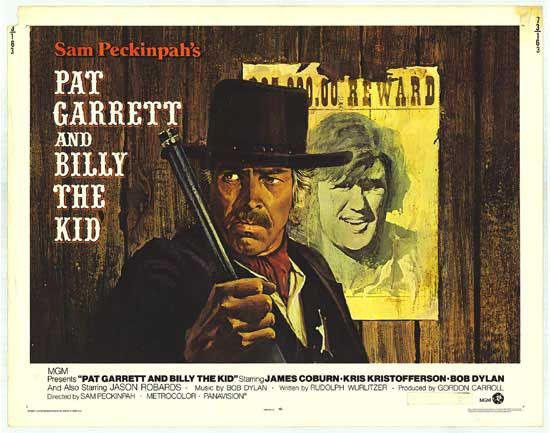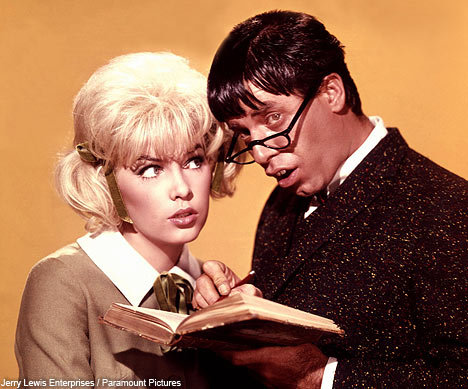Auteurs and TV -- Incident at a Corner (Alfred Hitchcock, 1960)


Hitchcock’s sole foray into color for episodic television came with the hour-long variety series “Ford Startime”; it was filmed roughly a week after PSYCHO and aired the same year on

Angle on Incident # 2 (#3, below, to the left).

Hitchcock lets us observe this exchange play out three times in unhurried long-shots that move into mediums, with the audio being identical each time. Firstly, he focuses on the car as it reaches its parking spot; secondly, Hitch favors the jaunty stroll of Grimes, using a conveniently placed stop sign to obscure the mysterious second parties and their automobile, and thirdly, across the street as the middle-aged man, Harry (Jack Albertson), looks on. His companion, an older redhead whose name we later learn is Georgia (Eve McVeagh), rushes into their home, undetected and clearly concerned as to whether the participants in the minor scuffle have noticed her. They haven’t.
 Pat (Peppard) and Jean (Miles) interview Grimes (Paris), a teacher.
Pat (Peppard) and Jean (Miles) interview Grimes (Paris), a teacher.
Once Mr. Medwick arrives home, we’re introduced to what will become the unofficial detectives of the piece, soon-to-be-married couple (and Medwick’s daughter) Jean (Vera Miles) and Pat Laurence (George Peppard). As a wry nod to Hitchcock’s playful device of re-showing the incident times three, Jean is a geometry tutor, going over mathematical angles with Ron (Warren Berlinger), the teenaged son of Mrs. Tawley. A phone call is placed by the latter, all off-screen, demanding Ron to leave for home and to sever ties with Jean’s skillful tutoring. Jean’s naturally upset by this unforeseen turn-of-events, figuring a misunderstanding somewhere, but Pat comforts her with notions that everybody gets fired, sooner or later.
Later that night, during the course of a birthday celebration for Mr. Medwick, also attended by other relatives (Bob Sweeney, Alice Backes) and Medwick’s good-natured wife, Elsa (Charity Grace), principal Rigsby (Wendell Holmes) lands on the family porch to drop a bombshell: a note’s been found in Mrs. Tawley’s automobile, accusing the elder Medwick of being a “vicious old man” fond of “little girls”.
The rest of the episode adapts to Jean and Pat in a series of talky sequences reminiscent of Simon Oakland’s psychological profile of Norman Bates at the close of PSYCHO. The two question Uncle Jeffrey (Sweeney)’s belief that it’s best that this untruth be best forgotten about, lest it cast a pale glimmer on his business or on Jean’s and Pat’s upcoming nuptials. Uncle Jeffrey figures the grandfatherly figure is old enough to move in with them, and quietly live out the rest of his years rather than fight a battle that’s been tainted with such unseemly accusations. Pat’s the one who spearheads an inquisition into the matter: learning of the spat that Medwick had with Mrs. Tawley from Grimes makes him assume that she’s responsible for the note. Corroborating with her is Mrs. Sinden (Hollis Irving), a hysterical mother with an overbearing, huffing-and-puffing husband, Sidney (Joe Flynn).


The piece de resistance in these lengthy dialogue back-and-forths is the frank discussion between Pat, Jean, Principal Rigsby and the President of the PDA, Mrs. Parker (Mary Alan Hokanson). Mrs. Parker’s phoniness is readily apparent, as she calmly suggests that Mr. Medwick’s theoretical pedophilia is “an illness” and, accordingly, “you must think of it that way”. She’s not keen on attempting to get to the bottom of the matter, preferring rote, unimaginative answers to actually questioning the validity of the accusations.
Even when Pat assumes he has Mr. and Mrs. Tawley over a barrel (their young son is caught spying and, accidentally, harms Jean), his lawyer suggests that he wouldn’t touch the case because Medwick’s on “the wrong side of social opinion”.
The actual note-writer is a bit of a cheat and is played for whimsy with a dramatic tonal shift from the otherwise tense scenario. One can infer that Hitchcock figured it a cheap trick: why else would he foreground the facts so closely in the opening scene(s)? We know who it is, but half the fun is watching Pat and Jean righteously assume the worst in everyone, clinging to straw man theories before the actualities are revealed almost accidentally by happenstance. Pat and Jean pigheadedly refrain from even considering the possibility that Medwick may not be innocent, and their forthrightness is something that Hitchcock obviously doesn’t condone: they’re guilty in their own way for following simple logistics without giving thought that the reality may be a tad more complicated.
Hitchcock manages to discuss such a disturbing issue in 1960 an evenhanded way – we all know what “fond of little girls” equals without getting into the indecent specifics (something a newer program like “Law and Order: SVU” has no problem in doing, week to week). Even more are the subtle suspicious actions from secondary characters, like Ron and Sidney: why does the former spy on the Medwick household, is he afraid of being found out for something similar to what Medwick’s been accused of? And
Labels: Alfred Hitchcock, auteurs on TV




 My LP Collection
My LP Collection












